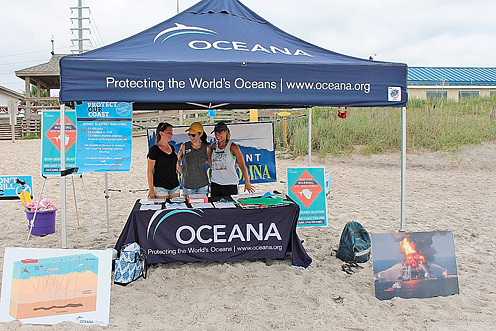By Katie Dickens
Intern
Volunteers from environmental groups Oceana, Surfrider Foundation and Environment North Carolina campaigned in Topsail Beach and Kure Beach this week to encourage more public opposition to seismic blasting and testing off the coast of the Atlantic.
The educational tour follows the U.S. Department of the Interior’s March announcement for a five-year prohibition of industrial drilling for oil and natural gas off of the Atlantic Coast. Although offshore drilling has been suspended, the government is still reviewing numerous seismic blasting permit applications, Environment North Carolina representatives stated.
Seismic blasting, or testing, refers to the first step of the offshore drilling process in which seismic air guns are towed behind ships and shoot compressed air at the ocean floor to gauge if there is oil underneath. Studies suggest the testing poses a threat to marine wildlife.
“The seismic guns go off every 10 seconds, 24 hours a day for months at a time,” said Mackenzie Dalton, an Environment North Carolina intern. “They can devastate the area, especially in how they interrupt whales and dolphins, because it can disturb how they communicate and hear.”
The goal of the environmental groups is to encourage the federal government to ban seismic testing, and encourage the use and development of newer testing technology, Dalton said.
“We have loggerhead sea turtles and whales off the North Carolina coast that are currently threatened,” Dalton added. “Testing could also seriously impact fisheries because fish flee the area if there is extreme noise in the same place over time. Local businesses rely on those fish.”
Following environmental advocates’ success in rallying local opposition to federal offshore drilling plans, the groups said they want to get similar citizen and local government support behind opposition to seismic testing. Randy Sturgill, Oceana’s senior campaign organizer for the Southeast region, noted that more than 80 percent of North Carolina’s coastal towns passed resolutions against offshore drilling and testing, including Wrightsville Beach in September 2010.
Sturgill said the three-day tour has been very successful so far, as the groups gathered 117 signatures for a petition at the three-day tour’s first stop in Atlantic Beach on Monday, urging the Department of the Interior to ban seismic testing. After the tour, the groups will also begin contacting local coastal businesses to encourage their support as well.
“One of my favorite things to see if that we’re standing with bipartisan support,” Sturgill said. “We have people who are the most right-wing possible and people that are extremely to the left that agree that this is dangerous for coastal communities. Coastal residents are saying no — not on our beach. Our beach is not for sale.”
Sturgill added that social media has been a valuable tool for spreading his organization’s message. Over the course of the day, visitors posed with an Instagram cutout and other props and tweeted at President Barack Obama.
“Over the course of these three days we are using social media and reaching out to bring in people that aren’t already in our corner, but also people who are vacationing from all parts of the country so they become aware of this too,” Sturgill said.
Anna Windle, an Environment North Carolina intern from Elkton, Maryland, said she encourages residents of North Carolina beach towns to write to their local representatives about the issue.
“This could happen across the coast,” Windle said. “Citizens truly have power. You can do a lot to make change if you show that you care.”
Sturgill said Wednesday’s destination of Kure Beach is an example of the power of the grassroots movement against offshore oil drilling.
“Kure Beach is a great example of the power of the voice of the people,” Sturgill said. “Two years ago, when their former mayor sent in a letter to the federal government in support of offshore drilling, people absolutely flooded the town hall, saying that action did not represent their views.”
Kure Beach’s former Mayor Dean Lambeth was defeated by challenger Emilie Swearingen in the 2015 election. One of Swearingen’s first acts as mayor in January was to lead the town’s council to pass a resolution opposing offshore drilling.





The public deserves to hear the facts and science about seismic surveys but, unfortunately, environmental groups such as Oceana campaign using misinformation, myths, scare tactics and distortions of the truth. Here’s an example: https://thenorwoodresource.org.au/2014/04/26/how-can-oceana-justify-misleading-the-public/ They have not “changed their spots” – they still mislead a caring and giving community.
[…] to seismic blasting. Earlier this summer, for example, several environmental groups took part in a three-day tour of North Carolina coastal communities to educate beachgoers about the hazards of seismic testing and to ask them to sign a petition […]
[…] See the full Lumina News story here. […]